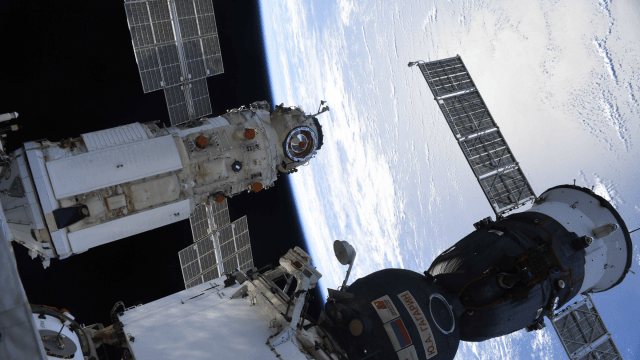Russian cosmonauts aboard the International Space Station are continuing to sort through an issue that caused the newly arrived Nauka module to inadvertently fire its thrusters after docking to the orbital outpost.
The situation now appears to be under control, but, for a 47-minute stretch yesterday, things got weird and even a bit frightening.
At around 12:34 p.m. EDT, some three hours after docking to the ISS, the newly arrived Multipurpose Laboratory Module (MLM), or Nauka, began to fire its thrusters. As a result of this unexpected propulsion, the station lost its attitude control, causing it to drift at a rate of around half a degree per second, as ISS program manager Joel Montalbano explained at a NASA press briefing held yesterday. In total, the surprise boost caused the space station to shift by around 45 degrees, mostly in pitch.
Russian flight controllers reacted by switching off Nauka’s thrusters. Thrusters on the Zvezda module and a docked Progress cargo ship then brought the space station back into its normal position. Attitude control was regained at 1:29 p.m. EDT, according to NASA.
“At the moment, the station is in its normal orientation, all the ISS and the multipurpose laboratory module systems are operating normally,” Vladimir Solovyov, flight director of the Russian segment of the ISS, explained in a Roscosmos statement. “A reliable internal power and command interface was created, as well as a power supply interface that connected the module to the station.”
NASA said the ISS Expedition 65 crew was never in any danger, and there are no reports of damage. Montalbano said he was “not too worried” about the incident, saying mission controllers are thoroughly trained for situations like this. A recurrence is no longer possible, he added, saying Nauka’s thrusters were “inhibited” by the Russian controllers.
“This is one of the more serious incidents in the 24-year-history of the ISS,” Jonathan McDowell, an astrophysicist at the Harvard-Smithsonian Centre for Astrophysics, wrote to me in an email. “The loss of attitude control in principle risks breakup of the complex.”
McDowell pointed to a 2016 incident in which the Japanese Hitomi satellite, after experiencing issues with its attitude control system, entered into an uncontrollable spin, causing it to break up. The situation on the ISS was “not as extreme,” he said, and the ISS “probably” didn’t come close to experiencing any structural failures, wrote McDowell, “but you don’t want a 400 tonne station with big flexible parts like solar arrays to be falling end over end.”
McDowell said he’s worried about the condition of some exterior experiments attached only by wire ties. The “fight” between Nauka and the other modules for control — in which multiple sets of thrusters were engaged — could’ve set up “oscillations in flexible parts of the structure, especially “radiators and solar arrays,” in which design tolerances may have been exceeded, he wrote.
Solovyov said a “short-term software failure” was to blame for the mishap, in which a “direct command was mistakenly implemented to turn on the module’s engines for withdrawal, which led to some modification of the orientation of the complex as a whole.”
As a result of this inadvertent thruster firing, NASA postponed today’s scheduled launch of an uncrewed Boeing CST-100 Starliner commercial crew vehicle. The second test of this vehicle is now scheduled for August 3 at 1:20 p.m. EDT. The postponement “allows the International Space Station team time to continue working checkouts of the newly arrived Roscosmos’ Nauka module and to ensure the station will be ready for Starliner’s arrival,” according to a NASA statement. For sure — sending a test spacecraft to the ISS while the crew continues to resolve a serious situation wouldn’t have made a lot of sense.
Mission specialists are now trying to determine how much propellant was lost by the ISS as a result of the crew having to regain attitude control. Montalbano said the procedure didn’t exhaust the station’s fuel reserves, but it was “obviously more propellant that we wanted but nothing that I’m worried about.”
Russian cosmonauts are now running through a set of procedures to ensure the “unconditional safety” of the ISS and its crew, specifically tasks having to do with the Nauka module propulsion system, according to a Roscosmos statement. After this is done, the crew will open up the hatches, first the Zvezda Service Module and then the new Russian module. The cosmonauts will “open the hatches, enter the module, turn on the necessary means of purifying the atmosphere and begin normal regular work,” said Solovyov. They’ll also have to balance the pressure in the Nauka module, which will take some time, as the total volume of the module encompasses 2,472 cubic feet (70 cubic meters).
The Nauka module launched from the Baikonur Cosmodrome on July 21, but its initial thruster burn failed, forcing flight controllers to use backup engines. Concerns about a wonky antenna and docking port complicated matters even further, but the module docked “nominally” with the ISS on July 29 at 9:29 a.m. EDT.
The new module will provide added space for running experiments, storing cargo, and accommodating new water and oxygen regeneration equipment. Nauka features a second toilet for the Russian crew and an extra room for a third Russian crew member. The module also delivered a new airlock and the new European Robotic Arm (ERA), which will be the first robotic arm to service the Russian segment.
More: An Inspector Gadget-like robotic arm is headed to the International Space Station.
